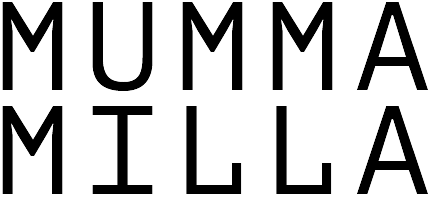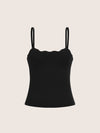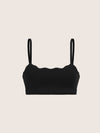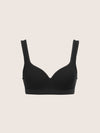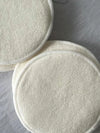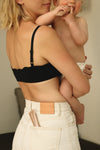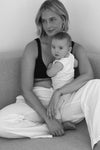Dr Eliza Hannam is a GP, board certified lactation consultant (IBCLC) and Possums Neuroprotective Care accredited practitioner. Mother to three beautiful children, the youngest being 21 months, she has personally experienced challenges with her babies’ sleep and breastfeeding, so her guidance and support is like none other for mother's out there who may be facing postpartum difficulties.
We're delighted to have Dr Eliza chat to us at M. Magazine about babies, breastfeeding and feeding schedules. She gives us some valuable pointers to look out for so you can be assured your baby is getting enough milk, as well as the postpartum symptoms that we can experience the first few days after giving birth.
Can you tell us a little bit about yourself?

I’m a GP and IBCLC and the founder of Nurtured Medical; a practice in Sydney that specialises in pregnancy and postpartum care including feeding and infant sleep support.
I’m also a Mum of three gorgeous kids, aged 7, 5 and 21 months.
How has being a mother shaped your experience / knowledge as a GP and IBCLC ?
"It is my experience as a mother, that has shaped my career most significantly."
My own experiences and challenges have directly led me to work in this area.
When I had my first child, I found her sleep most challenging – though I now know that she was completely normal, it wasn’t what I was expecting and it rocked me to my core! I then had unexpected difficulties breastfeeding my second child, and to this day I can say it was one of the most challenging experiences I’ve ever faced. I found it difficult to get the professional support that I needed, and it inspired me to learn more so that I could support others facing their own difficulties with feeding.
Overall, having children has been so humbling. I think back to the advice that I gave new parents when I first started out as a GP and didn’t yet have my own children and I cringe a little!
How can a new mum preparing to give birth to her baby prepare herself for a breastfeeding journey?
Preparation for breastfeeding during pregnancy can be so invaluable!
There are many online courses available that cover essential information to feel informed and prepared– but if it’s available, it can be so helpful to see an IBCLC for face to face support before the baby even arrives. In my antenatal lactation education appointments, I spend 60 minutes talking through how breastfeeding works, how to optimise the chances of successful breastfeeding, what good latch and positioning look and feel like, support with hand expressing colostrum (if appropriate) and lots of general information about newborn feeding, sleep and behaviour.
Breastfeeding myths that need de-bunking!
Please share with us some of your favourites.
-
That breastfeeding is natural and should therefore be easy.
Counterintuitively, it is commonly not easy; at least to start with. Whilst there is a lot of instinct at play for both mother and baby, it is also a learnt skill for you both! Even if you’re breastfed previously, if you have another baby it’s new to them and sometimes will still take a little while for you to find your groove together. Importantly, even if feeding is tricky to start with, with the right support most people get through it and are able to successfully breastfeed
-
That babies should be breastfed to a schedule – which might include deliberately “spacing” breastfeeds.
What I mean by this is the idea of avoiding or delaying breastfeeding a baby who seems hungry or interested until it has been a certain amount of time since their last feed, for example 3 hours.
Of course there are some babies/ dyads who only need to feed 3-4 hourly, but many young breastfed babies will need to feed more often than this, especially in the day – commonly up to 12 times in 24 hours.
Spacing feeds can potentially negatively impact breastfeeding. It can reduce breastmilk supply if the breasts are not emptied frequently enough and it can also mean that the baby doesn’t get as much milk as they need.
Some postpartum symptoms we can experience, and may not know about after giving birth.
- The “afterbirth” pains from the uterus contracting back down after birth. These are typically most significant in the first 2-3 days after birth but can last for a week or more and are often triggered by feeding.
- The sweats due to hormonal changes after pregnancy – often most notable at night!
- The “day 4 blues” – it’s common to experience tearfulness, anxiety and feeling overwhelmed in the first week postpartum and it is thought to be in part triggered by significant hormonal changes in this time.
- The breast engorgement when the milk first “comes in” – due to increased milk in the glands but also fluid/ swelling under the skin and around the breast glands.
Whilst all of these symptoms can be normal (albeit surprising!), it’s of course important to seek medical attention if prolonged or severe as they can all potentially be symptoms of other more serious conditions, too.
The importance of finding a comfortable nursing bra, especially for when milk comes?
I had no idea how intense and uncomfortable it could feel when the milk comes in! For me, like many others, it meant huge, hard, leaky and throbbing breasts. It is so important to have a comfortable nursing bra that isn’t too tight or restrictive – as this can lead to pain and issues such as blocked ducts and mastitis.
Other important strategies that help with engorgement include cooling, feeding on demand, and measures to reduce the swelling behind the areola before latching the baby for a feed.
What is your advice for mums who are not sure if their baby is getting enough milk from feeds?
Many families find it disconcerting not knowing how much breastmilk their baby has during a direct feed. This can be especially so if there have been early concerns about weight or feeding, for babies who are fed with a combination of direct feeding and bottles, or for families who have previously had a bottle-fed baby.
Reassuring signs that generally suggest a baby is getting enough milk include:
- Waking for and demanding feeds regularly (typically 8-12 times in 24 hours for young babies)
- Having periods of the day when they are content and awake, and some periods when they sleep well after a feed (though they might do this best in the arms of a parent!)
- Having 6-8 clear wee nappies in a day
- Having 2-3 mustard soft poos per day for the first 4-6 weeks (after this it can vary considerably for breastfed babies)
- Gaining weight appropriately: typically, breast fed babies should gain approx 120-240g per week, for the first 3-4 months (this will vary week to week and depend on where the baby is on the growth chart). Once a baby has “found” their centile on the growth chart, they should track along the shape of the curve
- As a GP/ LC, I am also reassured if a baby looks well hydrated and has visible adipose tissue (fat) stores under their skin - ie chubby cheeks, extra chins and fat rolls
What have your breastfeeding journey's been like for you, personally?
With my first baby, I had what I now realise was an unusually easy breastfeeding experience. We fed for about 13 months and even weaning was quite straight forward.
I therefore expected the same for my second and it could not have been more different! He was quite sleepy and jaundiced after birth and we had issues from the get-go with breast refusal. So we “breastfed” via a pump and bottle - I ended up exclusively expressing for almost 12 months. I could not have anticipated the emotional impact of breastfeeding difficulties, in particular breast refusal. The silver lining was a passion to learn more and to help others and this led me to do further training and eventually complete my IBCLC training.
With my third baby, we had a slightly rocky start but it got much easier after the first 3 months and I was grateful for the support of other GP/ IBCLCs to help us get there. I’m still breastfeeding her at 21 months and love this part of our relationship. It’s still my best tool to support her to sleep and to help her co-regulate when she’s dysregulated. I have no specific timeframe/ goal in mind and will wait until one or both of us feel ready to wean.
We'd love to hear what you think of our MUMMA MILLA leakproof collection.
They are so soft, comfortable and beautiful and I only wish that I had discovered them earlier in my feeding journey. After trying them the first time, I immediately bought some for my sister who is expecting her first baby in the next few weeks.
I was always very leaky in the early days of breastfeeding so presume I may have needed washable breast pads in addition to the leak-proof cami/ bralette - but now that this has settled, I don’t need these and the cami/ bralette provide the perfect amount of protection against leaks as they are.
Dr Eliza wears our leakproof nursing cami with scallop detail. Shop it here.


You can find Dr Eliza at Nurtured Medical.
Dr Eliza does offer consults via Telehealth, Home Visits in Sydney’s Inner West and in our Annandale practice.
Dr Eliza is available on Tuesdays, Thursday afternoons and Fridays.


